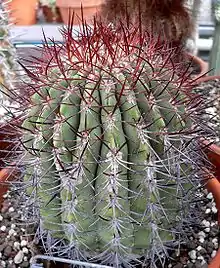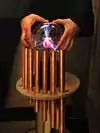Amplified cactus
An amplified cactus is a cactus plant (preferably a Denmoza or Geohintonia) used as a musical instrument. It harnesses the acoustic properties of a cactus, by applying contact microphones and amplifying their projection and tone.[1] Vivien Schweitzer of The New York Times reports "Jason Treuting played an amplified cactus, running his hand over the plant's unfriendly spikes to produce an alluring sound like a babbling brook."[2]
 Photo of Denmoza rhodacantha at the University of California Botanical Garden | |
| Electronic instrument | |
|---|---|
| Musicians | |
| Jason Treuting |
The amplified cactus is a medium rarely written for, even in the contemporary music genre. John Cage composed Child of Tree (1975) and Branches (1976) for what he described as "amplified plant materials". Cage was a large proponent of chance music and felt that the organic nature of music without man-made instruments was very strong and influential. Another of the most famous pieces for amplified cactus is Degrees of Separation "Grandchild of Tree" by Paul Rudy which received mention at the Bourges International Competition for Electroacoustic Music in 2000.[3] Rudy mentions in his own program notes:[4]
The idea for a cactus and tape work came about when I heard a performance of John Cage's Child of Tree. I was immediately taken with the sound of the cactus in particular. Taken from its natural environment and placed in the confined and groomed existence of a pot, amplified with a contact microphone, the cactus took on a completely new and interesting character...
A piece by Mark Andre, ...zu Staub... also features three amplified cacti alongside classical instruments.
See also
References
- Jenkins, Greg. "Cactus". Australia Adlib. Retrieved 2010-06-18.
- Schweitzer, Vivien (2007-07-20). "It Makes a Great Sound; Just Watch out for the Spikes". The New York Times. Retrieved 2010-06-18.
- Paul Rudy Extended Bio Archived June 30, 2010, at the Wayback Machine
- Paul Rudy, Program Notes Archived June 30, 2010, at the Wayback Machine

